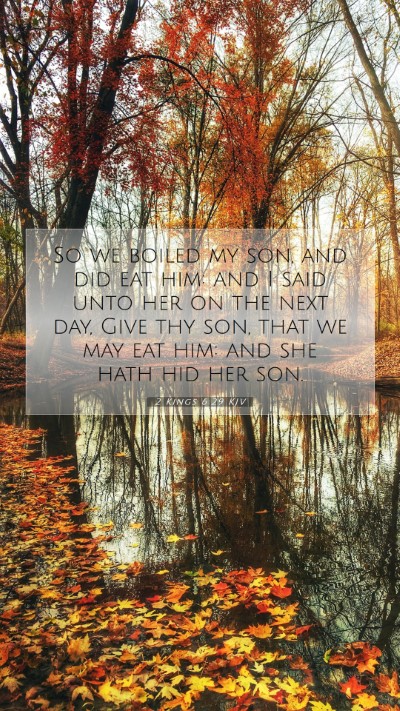Understanding 2 Kings 6:29: A Comprehensive Commentary
Verse: "So we boiled my son, and did eat him: and I said unto her on the next day, Give thy son, that we may eat him. And she hath hid her son."
This verse is one of the most shocking and tragic passages in the Bible, illustrating the dire conditions during the siege of Samaria. It reflects deep desperation and moral decline as famine grips the city, leading to extreme measures.
Context of 2 Kings 6
The context of this verse is critical for understanding its significance. The city of Samaria was under siege by the Arameans, resulting in a severe and devastating famine. The people experienced extreme hunger, leading them to consider unimaginable acts of desperation.
Summary of Interpretations
-
Albert Barnes:
Barnes emphasizes the extreme conditions that drove the people to cannibalism, signifying not only a physical hunger but also moral corruption. The verse illustrates how society can descend into chaos when faced with starvation and suffering.
-
Matthew Henry:
Henry discusses the horrors faced by the people of Samaria. He notes that the act described in the verse reveals the depth of despair and the ultimate breaking point of humanity. This historical account serves as a warning of the consequences of turning away from God's provision.
-
Adam Clarke:
Clarke provides insight into the desperation of the situation, highlighting that such actions were not merely physical acts of survival but also a representation of a society in complete moral decay. His commentary notes the symbolic nature of the passage in reflecting spiritual desolation when one turns away from God.
Bible Verse Meanings and Themes
This passage brings forth several significant themes relevant to biblical interpretation and understanding:
-
Desperation and Human Survival:
The verse highlights the depths to which people can sink when faced with life-threatening circumstances, symbolizing the primal nature of survival.
-
Moral and Ethical Decline:
It serves as a sobering reminder of how calamity can distort morality, emphasizing the fragility of ethical standards under extreme pressure.
-
Faith and Trust in God:
Amid such desperation, the need for reliance on God becomes evident. The failure to trust in divine provision can lead to catastrophic decisions.
-
Ultimate Consequence of Sin:
This incident reflects the broader biblical narrative that sin leads to destruction and severe consequences, even to the point of societal collapse.
Application to Daily Life
Though this verse describes a historical event, its lessons are timeless:
- It teaches that we should seek divine assistance in difficult times and avoid actions that compromise our morals.
- It encourages introspection on our values and the importance of community support during times of hardship.
- We are reminded of the need for compassion and empathy in our interactions with others, particularly during crises.
Cross References
Related passages that enhance understanding of 2 Kings 6:29 include:
- Deuteronomy 28:53-57: Prophetic warnings about the consequences of disobedience leading to famine.
- Jeremiah 19:9: Descriptions of horrific acts during sieges as a result of God's judgment.
- Lamentations 4:10: Further illustrations of despair during the siege of Jerusalem.
Conclusion
2 Kings 6:29 is a stark reminder of the consequences of extreme conditions and the moral challenges that arise during such times. The insights from this verse encourage Christians to reflect on their trust in God and to maintain moral integrity even in dire circumstances. Understanding this Scripture can deepen one’s Bible study insights and enhance knowledge of how to interpret Bible verses meaningfully.
For those engaging in Bible study groups or seeking Bible study resources, this passage serves as a poignant example of the importance of context in Biblical exegesis and practical application in daily life.


